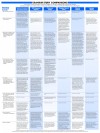A proposed resolution on uranium mining was yanked from the Pittsylvania County Board of Supervisors’ agenda Tuesday night after it was “sabotaged,” one supervisor said.
Banister District Supervisor Jessie Barksdale and Staunton River District Supervisor Mar-shall Ecker drafted the resolution. It was on the board’s agenda, but was removed by Barksdale at the beginning of the meeting.
“Mr. Ecker and I agreed to remove the resolution from the agenda because there is still strong opposition from some members of the board who will never vote in favor of any resolution on uranium mining, especially if it states keep the moratorium,” said Barksdale, who was clearly disappointed.
Barksdale and Ecker developed the resolution after the board held a public forum on uranium mining and milling in July.
“We reviewed the comments and captured the essence of the citizens’ concerns,” Barksdale said.
He and Ecker, with help from the county’s attorney, Vaden Hunt, developed the resolution on uranium mining “in confidence only to find out later that there was no confidentiality,” Barksdale said.
“In my opinion, we were doomed to fail even before we started, and all because certain elected officials have taken a do-nothing position so as to not reveal their true identity or interest pertaining to uranium mining in Pittsylvania County,” he said.
As news about the resolution spread, opposition surfaced from other board members as well as state lawmakers and even the governor’s office, Barksdale said.
“I’m still trying out figure out what happened,” he said. “How did they learn about the resolution so quickly? Why did they not contact the two supervisors who developed the resolution? The word sabotage sticks in my mind.”
The proposed resolution noted that the 2011 National Academy of Sciences study warned that disposal cells for uranium mill tailings “represent significant long-term risks for radiological and other contamination” and there is limited data to confirm the “long-term effectiveness of uranium tailings disposal cells.”
It went on to point out that “extreme natural events combined with human error have the potential to result in the release of contaminants if disposal cells are not designed, constructed or maintained properly, or if such cells fail to perform as envisioned.”
The resolution also said that, according to the study, Virginia has no experience with uranium mining and the federal government has “little or no experience applying existing laws and regulations to states with wet climates and extreme precipitation events.”
“It is absolutely clear, based upon the NAS and other studies, that it cannot be demonstrated to a reasonably degree of certainty that there would be no significant release of radioactive sediments downstream of the Coles Hill site under any circum-stances, and therefore, that the criteria in the resolution adopted by the Pittsylvania County Board of Supervisors on Feb. 17, 2009, have clearly not been satisfied,” the two supervisors said.
“The Pittsylvania County Board of Supervisors wants to reaffirm the importance of protecting its citizens should the moratorium on uranium mining and milling be lifted in the state of Virginia or only in Pittsylvania County,” the resolution continued, noting that local government is responsible for the protection of the health, welfare, and safety of its citizens.
The resolution asked that a monetary fund be established — administered by a third party — to compensate county citizens affected by uranium mining and milling within a five-mile radius of Virginia Uranium Inc.’s Coles Hill site about six miles northeast of Chatham.
It also asked lawmakers to in-sure that “appropriate regulations” be in place by either the state or federal government for the “comprehensive protection of our citizens.”
“Mr. Ecker and I worked in good faith to produce a resolution for the Board of Supervisors, but obviously our effort was not perceived that way by some of our peers,” said Barksdale.
Ecker said the resolution isn’t dead.
“I know a lot of people are waiting for a resolution,” he said. “There will be one coming back. I’m not going to sit on this.”
About a dozen people weighed in on the resolution during the hearing of citizens.
Deborah Dix of Blairs urged supervisors to pass a resolution for a permanent ban on uranium mining.
“Clean air and water is the right of every American,” she said.
Linda Worsley of Chatham agreed.
“We need to look after ourselves,” said Worsley. “We need to keep the ban on uranium.”
